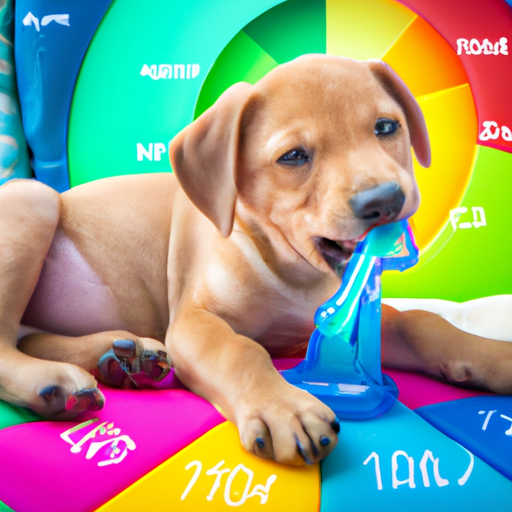Teething is a normal part of a puppy’s growth and development, but as a caregiver, it can sometimes feel like an endless ordeal. The constant chewing, drooling, and general discomfort can be a lot to handle. But don’t worry, it’s not forever. Let’s dive in to uncover the intriguing journey of puppy teething.
Understanding Puppy Teething
Teething is part of the natural process for puppies as they transition from their ‘baby’ teeth to their adult ones. The process begins when puppies are around three weeks old and continues until they are about six months old.
During this time, puppies will go through several stages:
- Deciduous Teeth Stage – This stage is when the baby teeth, also known as deciduous teeth, start to appear. This usually occurs when puppies are between 3 to 6 weeks old.
- Transition Stage – During this stage, the baby teeth start to fall out to make way for the permanent adult teeth. This usually happens when puppies are 3 to 6 months old.
- Permanent Teeth Stage – The final stage is when all the adult teeth have erupted, and this typically happens by the time puppies are 6 months old.
Symptoms of Puppy Teething
During the teething process, puppies experience discomfort as their new teeth push through the gums. Here are some signs to look out for:
- Excessive chewing
- Drooling
- Changes in behavior
- Loss of appetite
- Red, swollen gums
How to Help Your Teething Puppy
As a caregiver, there are several ways you can help alleviate your puppy’s discomfort:
- Provide Chew Toys – Chew toys can provide some relief for your puppy’s sore gums.
- Use Teething Treats or Toys – There are specific products designed to soothe teething puppies.
- Frozen Treats – Freezing wet washcloths or specific puppy-safe treats can provide cool relief.
What to Avoid During Teething
While it’s important to soothe your puppy during this time, there are also things you should avoid:
- Avoid playing tug-of-war games as it can damage the growing teeth.
- Avoid hard chew toys that can cause damage to the teeth.
- Do not ignore excessive discomfort or changes in behavior.
When to See a Vet
While teething is a normal process, it can sometimes lead to complications. You should consult with a vet if:
- Your puppy has prolonged loss of appetite.
- You notice bleeding gums or other signs of infection.
- Your puppy seems excessively distressed or uncomfortable.
The End of Teething
Teething generally ends around six months of age, when the adult teeth have fully erupted. However, every puppy is unique and this timeline can vary slightly.
Frequently Asked Questions
Q: Is it normal for puppies to lose teeth?
A: Yes, it’s completely normal for puppies to lose their baby teeth, just like human children do.
Q: Can teething cause my puppy to be irritable?
A: Yes, the discomfort of teething can make puppies irritable or lethargic.
Q: Should I brush my puppy’s teeth during teething?
A: Yes, brushing can help keep your puppy’s mouth clean and reduce the risk of infection.
Q: What if my puppy swallows a baby tooth?
A: Generally, it’s not a problem if your puppy swallows a baby tooth, as they usually pass through the digestive system without issue.
In conclusion, puppy teething can be a challenging time for both you and your pet. However, with understanding, patience, and the right approach, you can help your puppy navigate this phase with less discomfort and stress.



